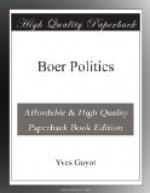“Of course I know from previous correspondence that you and the President are not disposed to minimize the blots on the administration of the South African Republic, the weak points in the Constitution, and the ignorance and laxity that prevails in financial matters. To do so would be to fatally complicate the situation.
“I am sure that you will, and I most strongly urge you to use your utmost influence to bear on President Krueger to concede some colourable measure of reform, not so much in the interests of outsiders as in those of his own State.
“Granted that he does nothing. What is the future? His Boers, the backbone of the country, are perishing off the land; hundreds have become impoverished loafers, landless hangers-on of the town population. In his own interests he should recruit his Republic with new blood—and the sands are running out. I say this irrespective of agitation about Uitlanders. The fabric will go to pieces of its own accord unless something is done.”
Such is the opinion of Mr. Merriman, a friend of the Transvaal, yet every day in Europe one is told that its misfortunes are due to the Uitlanders.
Mr. Merriman thought on the contrary that it was necessary to ask them to come forward and help the State out of its ruinous course.
“Surely it would be better to come forward now and earn the gratitude of South Africa by a comprehensive and liberal measure than to have the State torn and distracted by constant irritation and bad blood. A moderate franchise reform and municipal privileges would go far to satisfy any reasonable people, while a maintenance of the oath ought to be a sufficient safeguard against the swamping of the old population.
“President Krueger should reflect that nine out of ten people that receive the franchise will be supporters of the Republic in which they will have an interest, and that he will, by granting liberal reforms, disarm all opposition provoked.
“Try and persuade President Krueger to confer a benefit on the whole of South Africa by granting a broad measure of reform, and you will have done the best day’s work any statesman ever did in South Africa.”
Two months after the declaration of war, while the Boers’ military operations were somehow successful he wrote to Mr. Piet de Wet also a member of the Cape Parliament—“it is hopeless....”
“If the Republics
had not made the fatal mistake of sending the
ultimatum when they
did, things would have gone differently; but it
is of no use going back
on what might have been.”
His letter had no effect upon Mr. de Wet, who now is under trial for high treason along with three other Members of the House.
There are other letters, among them one written by Mr. Te Water, who left the Schreiner Ministry. In a speech delivered at Graaff-Reinet some time ago he has declared that the Cape Government ought not to have allowed the railway lines to be used by English troops. Yet in a letter to President Steyn on the 8th of May, 1899, he asked him to put pressure upon “our friends in Pretoria” to adopt conciliatory measures. Alluding to the impending Conference he writes:—




